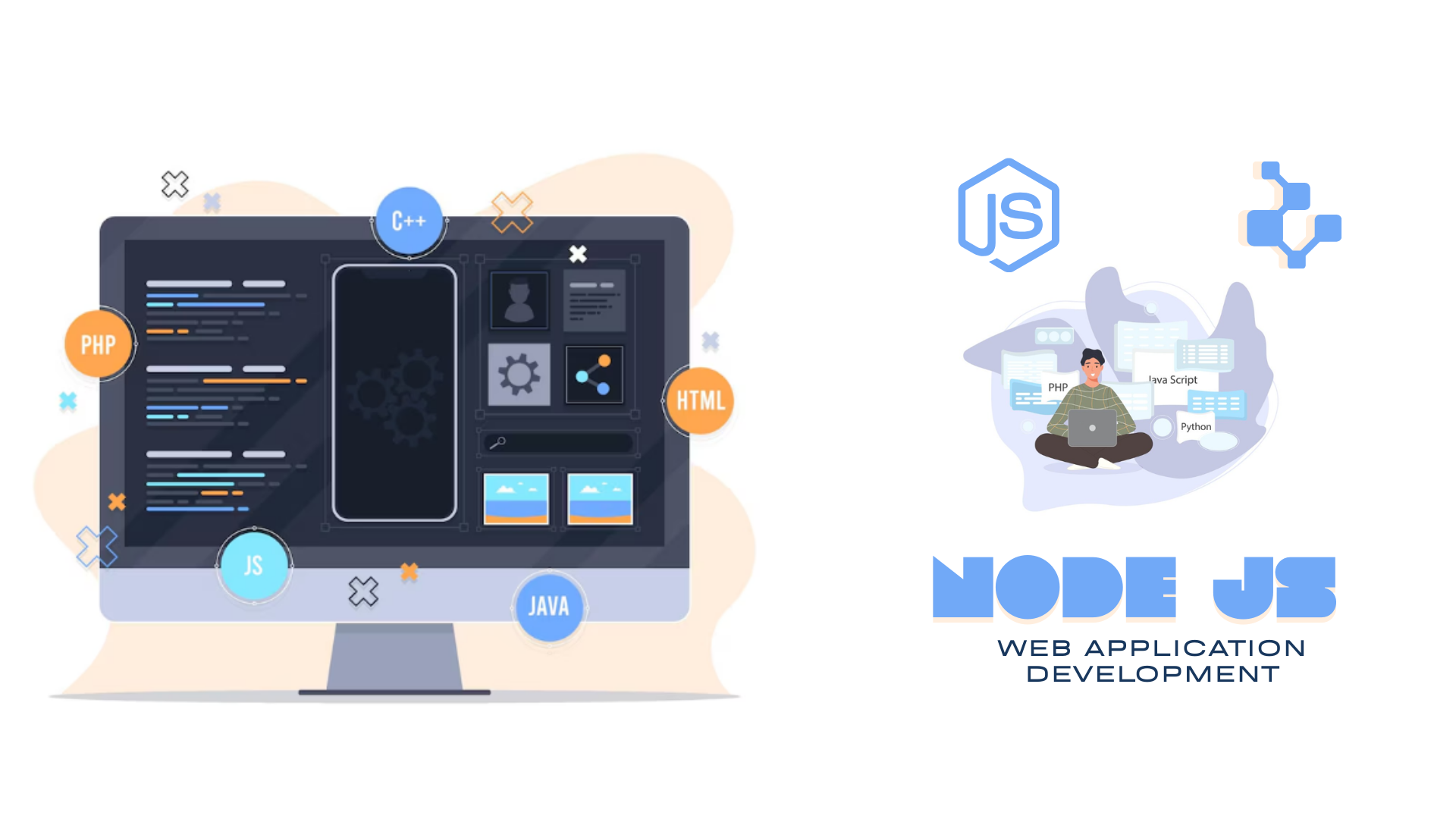Why Choose NodeJS for Web Application Development?
One technology that has consistently stood out is NodeJS. As businesses increasingly shift toward digital solutions, many leading tech firms, including the No.1 Software Development Company in Dubai, leverage NodeJS to create high-performing web applications for their clients.
NodeJS combines efficiency, flexibility, and scalability, making it an ideal choice for startups and enterprises alike. In this blog, we’ll discuss why NodeJS has become a preferred technology, its key benefits, and how it enables Top Software Developers to create customized software that meets today’s demands.
1. What is NodeJS?
NodeJS is an open-source, cross-platform JavaScript runtime environment built on Chrome’s V8 JavaScript engine. Unlike traditional JavaScript, which operates only within the confines of a browser, NodeJS allows JavaScript to run server-side, making it possible to build both client-side and server-side applications in one language. This aspect alone simplifies the development process, reduces costs, and enhances collaboration between teams.
By enabling the use of JavaScript across the stack, NodeJS removes the need for switching between languages, which is particularly useful for the creation of real-time applications, microservices, and data-intensive applications.
2. Advantages of Using NodeJS for Web Application Development
A. High Performance and Speed
NodeJS’s performance capabilities are rooted in Google’s V8 engine, which compiles JavaScript directly to machine code, allowing it to execute extremely fast. This speed is essential for applications with high demands, such as streaming platforms, collaborative applications, or other systems requiring real-time interaction.
B. Single Programming Language Across the Stack
With NodeJS, developers can use JavaScript for both frontend and backend development, creating a seamless and efficient development process. It simplifies knowledge sharing, speeds up debugging, and reduces context-switching for developers, which is why it is widely adopted by Top Software Developers looking to maximize efficiency.
C. Scalability
NodeJS is highly scalable, making it suitable for both small-scale applications and enterprise-grade systems. By default, NodeJS employs a non-blocking, event-driven architecture, making it easy to handle numerous simultaneous connections without compromising performance. This scalability helps accommodate growing user bases without a complete overhaul of the application’s architecture.
D. Rich Ecosystem with NPM
NodeJS’s package manager, NPM (Node Package Manager), provides access to over a million packages. These modules simplify everything from building user interfaces to managing databases and handling HTTP requests. With NPM, developers can quickly find and integrate solutions, enabling them to focus on creating customized software solutions for specific business needs.
3. Why Businesses Prefer NodeJS for Web Applications
A. Faster Time-to-Market
For businesses, getting a product to market quickly can make a substantial difference. NodeJS’s lightweight architecture, combined with its use of a single language across the stack, means that development teams can complete tasks faster. The rapid development capabilities of NodeJS allow companies to keep pace with competitors while maintaining the flexibility to adjust as needed.
B. Cost-Effective Development
With NodeJS, fewer resources are required to create robust applications, reducing operational costs. Because it eliminates the need to hire separate frontend and backend developers, NodeJS can save companies money and improve productivity, making it a popular choice for the No.1 Software Development Company in Dubai and similar firms worldwide.
C. Enhanced Real-Time Features
NodeJS has an inherent advantage when building applications with real-time features like chat, live notifications, and collaborative tools. Due to its non-blocking architecture, NodeJS can handle multiple requests simultaneously without slowing down, ensuring seamless and responsive user experiences for applications in any industry.
D. Microservices Compatibility
Microservices architecture is a popular approach in web development due to its flexibility and scalability. NodeJS is inherently compatible with microservices, allowing developers to build small, independent services that can be deployed and scaled separately. This modular structure is highly adaptable, making it easy to add features without disrupting the entire system.
4. NodeJS Use Cases in Web Application Development
A. Streaming Services
NodeJS’s asynchronous nature and event-driven architecture make it ideal for streaming applications. Platforms such as Netflix leverage NodeJS to handle high volumes of data with minimal latency, ensuring smooth user experiences even during peak times.
B. E-commerce Platforms
E-commerce websites often require real-time functionalities, including live inventory management, payment gateways, and chat support. NodeJS’s ability to handle numerous simultaneous connections without blocking the server enables businesses to create scalable and efficient e-commerce platforms that accommodate growing traffic.
C. Real-Time Collaboration Tools
Applications like Slack and Trello, which rely heavily on real-time data updates, benefit from NodeJS’s non-blocking architecture. This allows multiple users to interact with the application simultaneously without lag, providing a seamless experience that is essential in collaborative workspaces.
D. Single Page Applications (SPAs)
Single Page Applications (SPAs) allow users to interact with applications without refreshing the page. NodeJS’s compatibility with SPAs enhances the interactivity of web applications, making it suitable for platforms that require smooth user interactions.
5. Security and Performance in NodeJS
A. Security Features
NodeJS offers a range of security features to address vulnerabilities. Libraries and tools within the NodeJS ecosystem, such as Helmet and Bcrypt, help ensure secure data encryption and protection against common threats like cross-site scripting (XSS) and SQL injection. These features make it easy for developers to meet industry security standards, even for sensitive applications.
B. High-Performance Capabilities for Modern Applications
With its event-driven architecture, NodeJS excels at handling tasks that involve heavy I/O operations. Its asynchronous nature minimizes the time spent waiting on resources, which leads to a responsive application. This is particularly beneficial for data-intensive applications, such as analytics dashboards, where real-time performance is critical.
6. NodeJS Frameworks and Libraries to Accelerate Development
NodeJS is supported by a robust ecosystem of frameworks and libraries designed to simplify specific tasks and accelerate development. Some of the most popular include:
A. Express.js
Express.js is a lightweight web application framework for NodeJS that simplifies routing, middleware management, and HTTP handling. It’s known for its flexibility and is often used to build RESTful APIs, making it a preferred choice for developers creating customized software solutions.
B. NestJS
NestJS is a framework that brings modularity and scalability to NodeJS applications. Based on TypeScript, it’s suited for building scalable applications with complex backends. NestJS offers a structured approach to application development, making it popular for large projects requiring maintainability.
C. Socket.io
Socket.io is a library for real-time communication that integrates seamlessly with NodeJS. It’s essential for applications requiring instant updates, such as live-chat applications, real-time notifications, and multiplayer games.
7. Benefits of Choosing NodeJS for Customized Software Solutions
NodeJS offers extensive support for creating customized software solutions due to its versatility and adaptability. Here’s how:
A. Adaptable Architecture
NodeJS is highly adaptable, allowing developers to implement unique, business-specific features with ease. Its flexible structure makes it easy to integrate third-party APIs, utilize real-time data processing, and enable dynamic content creation, all of which contribute to creating tailored solutions for clients.
B. Rapid Prototyping and Testing
Node J’s lightweight nature facilitates rapid prototyping and testing. Developers can quickly build and test new features, gather feedback, and make improvements, which is invaluable for clients who prioritize agility and adaptability in their web applications.
C. Scalable Solutions for Growing Businesses
NodeJS is designed with scalability in mind, allowing businesses to expand their applications to handle increased traffic and new functionalities without the need for a complete overhaul. This scalability enables businesses to future-proof their applications, making NodeJS a go-to technology for top developers and businesses alike.
8. Conclusion: Embracing NodeJS for Your Web Application Needs
NodeJS has emerged as a key technology in web application development, with benefits like high performance, scalability, real-time capabilities, and cost-effectiveness. Its compatibility with microservices, paired with an extensive ecosystem of tools, makes it an ideal choice for businesses looking to build fast, dynamic, and scalable applications.
Whether you’re a startup building your first web application or an enterprise looking to enhance your digital infrastructure, NodeJS offers the flexibility and performance needed to drive success. As demonstrated by the software development company in UAE, companies that adopt NodeJS can leverage its advantages to deliver customized software solutions that meet the demands of today’s fast-paced digital environment.
Embracing NodeJS is a strategic decision that positions businesses for success in a highly competitive market. By choosing NodeJS, companies can ensure that their applications are not only high-performing but also future-proof, ready to meet the challenges of tomorrow.
To read more about Professional Wedding Dress Cleaning in Kings Langley














Post Comment